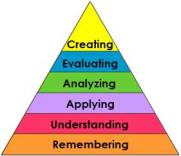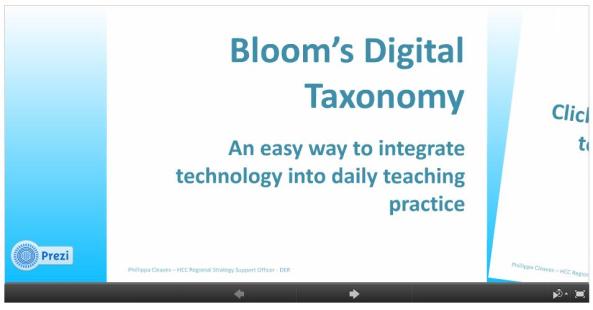Do you remember Bloom’s Taxonomy? I do – and I have to be honest – the first thing that pops into my head is not that it wasn’t my most engaging learning! I remember it in college and making sure that the 15 page lesson plan I had to turn had tried to reach as many of the

Original Bloom’s Taxonomy
levels as possible and then again it resurfaced when we wrote essential questions and units while making sure our curriculum maps were aligned with Ohio’s Academic Content Standards. In both cases, it was the kind of work that give you a headache – almost immediately!! Come on now, be honest, I am right, aren’t I?
So, I know it will be hard to believe that I would actually craft a post on my own ed tech blog in the area of Bloom’s Taxonomy, but I have been completely converted!!!!!!! Bloom’s Digital Taxonomy is the bomb! It makes perfect sense to take Bloom’s Taxonomy and connect it with the digital/ed tech world and create a clearinghouse of categorized resources that help engage each part all the while integrating and teaching 21st century skills – it’s all best practice!
This link that I found via Edudemic will take you to a Prezi presentation that also then allows your to click on links that are categorized within Bloom’s Digital Taxonomy.
You can click on all the links within the presentation and it will take you to each of the resources. View the presentation by clicking above or view it below:
Additional Bloom’s Taxonomy images/resources:
Related articles
- Two Wonderful Bloom’s Taxonomy Paint Palette for Teachers (teacherlingo.com)
- 22 Ways To Use Twitter With Bloom’s Taxonomy (teachingwithtechk12.wordpress.com)
- The 10-Minute Guide To Bloom’s Taxonomy | Edudemic (edudemic.com)
- Useful Web Tools to Integrate Digital Blooms Taxonomy into Your Teaching (teacherlingo.com)
- Useful Web Tools to Integrate Digital Blooms Taxonomy into Your Teaching (educatorstechnology.com)
- Integrate iPads Into Bloom’s Digital Taxonomy With This ‘Padagogy Wheel’ (shireen122chang.wordpress.com)
- New Detailed Taxonomy Wheel for Teachers (educatorstechnology.com)
- Interesting Graphic on Bloom’s Taxonomy (educatorstechnology.com)
- Playing Around With Blooms Digital Taxonomy (katherinedugdale.wordpress.com)
- Blooms Taxonomy Technology Pyramid (bea19lee.wordpress.com)








Thanks for sharing, although I think I have now lost most of my weekend as I go exploring some of these links and integrate them into my planning!
Oh, and to share back, I incorporate Blooms into my planning by having 3 level success criteria. This ensures that the lower ability feel successful and that they have got the foundation knowledge before trying to apply it. It also allows the higher ability (or more knowledgeable in this area) to more ahead to develop their ideas further. In the end the discussions/creations and feedback include everyone, so no one feels like they have been left out (or left behind). Each session starts fresh with new success criteria, but some 3rd level success criteria can run in the background over the course of a few sessions. It makes for a bit of extra planning, but feedback from my students (13 year olds in science) told me it was worth it.
Reblogged this on Bhutanese Teachers' Teaching at Trongsa Primary School and commented:
Engage your children. Read this if you like.